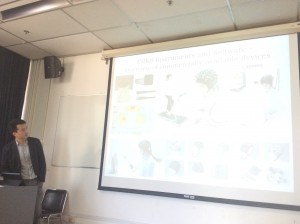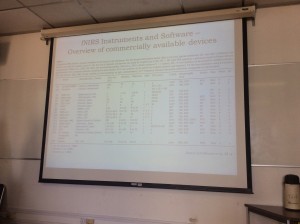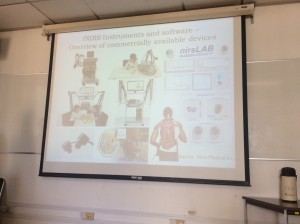Tag Archives: Functional Near-Infrared Spectroscopy
fNIRS – a neuroimaging tool for extending the interdisciplinary boundaries of learning research
Date: 30th Oct (Thursday), 2014
Time: 12:45 to 14:00
Venue: Room 205, Runme Shaw Building, HKU
Speaker: Dr Frank Zhu
Abstract:
Functional Near-Infrared Spectroscopy (fNIRS) is a non-invasive, non-ionizing, optical method to measure cerebral
cortex hemoglobin concentration responses to brain function in humans. fNIRS research is rapidly growing worldwide; the number of publications has doubled every 3.5 years over the past 20 years since the feasibility of fNIRS for functional braining imaging was first reported in 1993, which reflects the increasing number of scientists and clinicians beginning to utilize fNIRS for a broad range of applications in neuroscience. Because of its safety, low-cost, portability, and high temporal resolution, fNIRS is a promising tool for us to understand learning from neuroscience perspective and apply this knowledge in educational settings. Moreover, it is particularly suited for populations and measurement procedures for which other imaging modalities (e.g., EEG, MEG, PET, fMRI) are limited. For example, it is easily applicable in infants and children; procedures involving mobility and interactivity; and procedures performed in locations of common learning activities. The talk is divided into four sections: 1) Introduction to fNIRS principles, instruments and software; 2) Advantages of fNIRS compared to other brain imaging modalities; 3) Overview of fNIRS applications in research on learning; 4) Discussion on potentials for fNIRS development at HKU.
About the speaker:
Dr Frank Zhu obtained a degree of engineering from Tianjin University in 2006, and a PhD degree relevant to cognitive and learning sciences from The University of Hong Kong in 2011. He is now a joint postdoctoral fellow researcher of the Institute of Human Performance & Department of Surgery. He has a broad range of interests in the area of educational neuroscience, neuroergonomics, cognitive neuroscience, neurorehabilitation, and clinical neuroscience. His key area of expertise is brain imaging (EEG, fNIRS) and non-invasive neuromodulation (TES, TMS). He is an affiliated researcher to the HKU Science of Learning Strategic Research Theme, and also an official member of the Society for Functional Near-Infrared Spectroscopy (SfNIRS).







